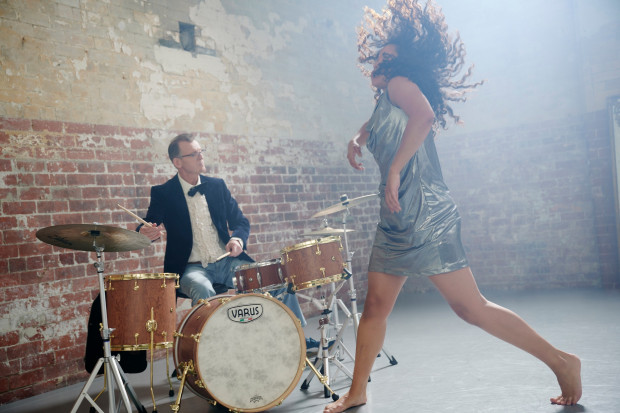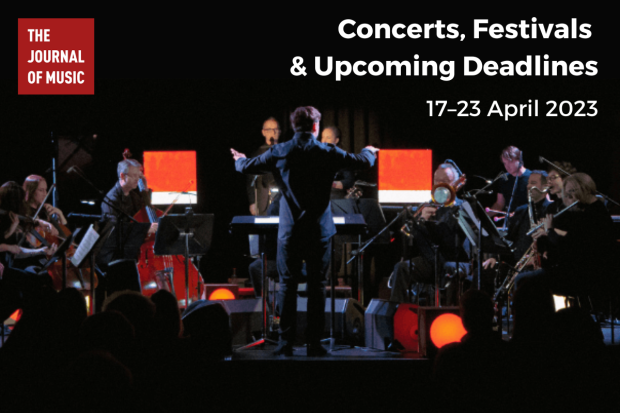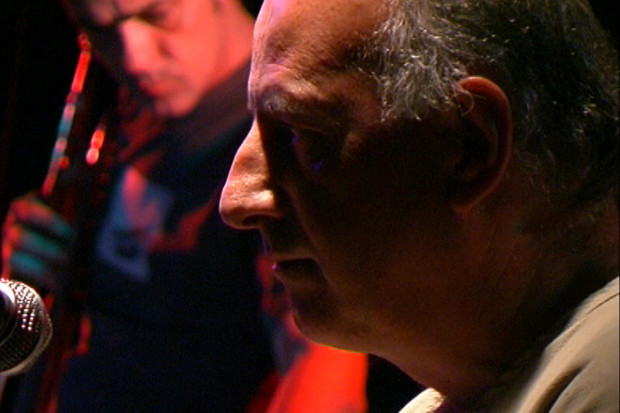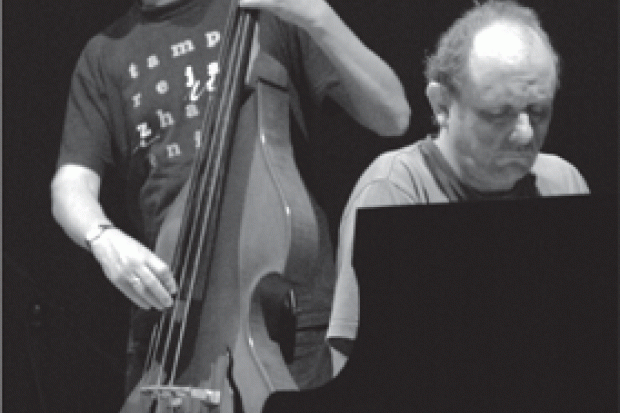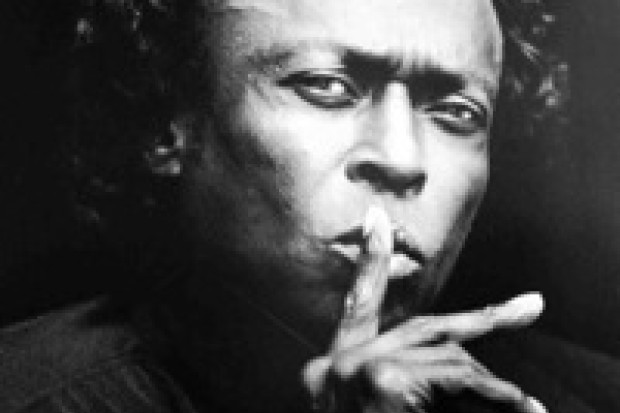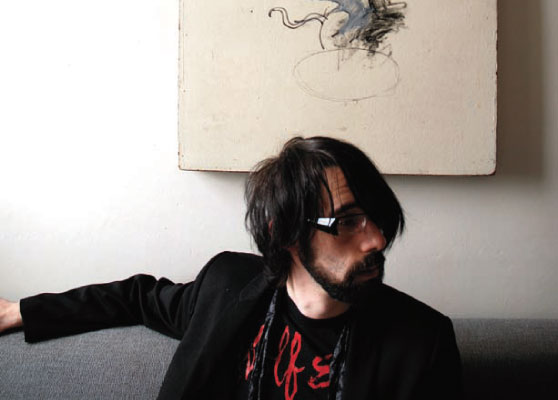
Be Careful of the Mark You Make
Flight AA 4296: Indianapolis to Chicago. A glance to my left reveals Indiana by night: an infinite grid of incandescent gold. In my hands is Sky Mall, a surrealist compendium of bizarre inventions and gratuitous gadgetry; the commercial imagination at its worst and best. In my ears, the light opening touches of improvising pianist Paul G. Smyth’s recent eighteen-minute work, for Christina Carter.
A delicate figure encloses itself, waiting patiently for harmonics to decay. There is a gradual expansion of palette, potentially pentatonic but obscured by dissonances. Chordal interjections follow without regularity amidst hurried runs, branching gingerly outward from the middle register. A stray note, at first totally new, becomes absorbed by the thickening texture.
Bass tremolos grow and the upper texture falls away to reveal Smyth’s trademark: an underworld of skirmishing harmonics, swelling to something deafening and falling away into silence. As a sweet chordal manoeuvre closes, I continue to hear the tremolos in my imagination. So often in Smyth’s music I imagine sounds where there are none, or the changes are so subtle that I perceive the whole piece to be dangling in a single-textured stasis.
In the business of life and commerce, all things must be a means to a desirable end, but Smyth traces a continuous but purposeless evolution from strata to strata. This is not the directional development of ambition and expectation, but a puritanical teasing-out in which the material suggests its own changing pace.
Werner Herzog, the filmmaker, talks of ‘ecstatic truth’, a meaning that cannot be expressed with words and ideas, something other than the ‘accountant’s truth’. Here, understanding is a function of experience, spontaneous and coincidental. Smyth’s music fills an experiential void, the necessary antidote to the functional purposefulness of modern life lying so vividly outside my airplane window.
The Doors Blow Open
Before I heard Smyth play for the first time, I knew him only by reputation as an untamable musician, possibly insane, at least unhinged, whose wild improvisations would on a good night leave the keys crimsoned with blood. (Watching him perform didn’t, at first, dispel too many of these assumptions, but time saw them fade.) I had deduced that any musician of such mysterious originality must be an autodidact. Watching and listening, it became clear that Smyth obviously had polished conservatoire technique; without this, the supposedly maniacal musical wizardry would simply not be achievable.
But technique is not the endgame. Smyth, who trained as a painter, learnt this early on, studying at the National College of Art and Design:
I was a good draughtsman. I was very slick. I had a tutor who said to me, ‘You’re work is very seductive.’ I could tell that he was saying, ‘You’re a show-off. You’re trying to blind people with technique.’ Another tutor, who understood the conundrum better than I did, took all my brushes off me, gave me household brushes and a five foot by fifteen foot piece of paper and said, ‘I’ll see you in three hours and I expect that to be finished.’ That had a huge effect on the piano – it couldn’t be about technique and I couldn’t be obsessive.
Naively then, I ask Smyth if he ever took piano lessons. ‘Absolutely,’ is his mildly astonished reply. From the age of three, Smyth was taught by his sister and brother, but later this homeschooling was replaced by studies at the RIAM and the College of Music.
As it happens, Smyth never wanted to be a musician; his aspirations were as a painter: ‘Life as a musician was entirely accidental…. I fell into a bad crowd or something. Also, I found the lifestyle that was and is associated with being an artist too isolated, too solipsistic.’
He played his first gig in his early twenties at the Players Theatre in Trinity College. Smyth now describes the performance, which was for Fender Rhodes run through a delay unit and fifteen percussionists, as, ‘The most bats thing I’ve ever been involved in.’ But Smyth was still finding his feet in music and would not have described himself as an improviser at that stage. He describes the years around that time as ‘a funnel for music’, his education mostly due to the Ilac Centre Music Library. Smyth remembers taking out eight tapes at a time. In one batch he picked up some early Miles Davis, Evan Parker’s Saxophone Solos and a record by the piano player Howard Riley. But it was a slow conversion. He put on Evan Parker and took it off after about ten seconds; a friend of his described it as ‘a flock of seagulls fighting over a sandwich.’ ‘Even Ornette Coleman was too much to handle,’ says Smyth. ‘Now I put on Ornette Coleman going to sleep, or with a nice glass of wine.’ But things changed: ‘Suddenly there’s that shift and the doors blow wide open. And after that anything can happen.’
One such moment was seeing Cecil Taylor play in New York: ‘The Cecil Taylor moment was huge: It took me two weeks to decide whether it was the worst gig I’d ever seen in my life, or the greatest. It ended up being the greatest, but it was touch and go for a while.’ Smyth found himself trying to reconcile all he thought he knew about music with what he had just seen and heard:
I was just so completely rattled by the whole thing, having gone through the College of Music, being so conscious of posture and hand positioning and all that. I watched this old man beat the the crap out of a piano for an hour and a half. There were no breaks. It was at full tilt the whole time. I was just so terrified, because he was playing with his fists. And it troubled me, greatly. After that I could listen to anything.
As Dirrerent or Alike as Trees
‘What’s wrong with leaving it nameless?’ said Feldman. But in our fearful search for our definable place in the world, we are intent on defining everything, even though our definitions unravel continually like a Penelope’s web of taxonomy. ‘It’s improvisation, sure,’ is Smyth’s submission.
Curiously, Smyth cites Messiaen’s Catalogue d’oiseaux, a collection of ‘composed’ pieces for piano, as the greatest piano music ever made. ‘They would leave any improvising piano player for dust.’ So is there an underlying difference between composition and improvisation? Perhaps they are merely two extreme, but badly defined points on a spectrum. To Smyth the only difference between his own work and that of Messiaen, is that Messiaen ‘left a paper trail’. Improvisation is in conception, then, not far from what Japanese vocalist Damo Suzuki terms as ‘instant composition’.
But Smyth’s work, it should be said, has also forayed into the dominion of notated and non-improvised music. From 2005 to 2006, Smyth attended the Music and Multimedia Masters course in Trinity College, Dublin. Smyth now describes this as ‘peripheral’, but it did lead to a body of electro-acoustic work such as for Michael Fleming, which was presented at the Sligo New Music Festival in 2006. For Smyth, working with electronics is ‘liberating’, but he is keenly aware of the potential for hollow gestures once the normal impetus for making work is removed.
The healthiest improvisation scene Smyth has encountered is in London at the Mopomoso (‘Modernism, postmodernism, so what?’) club in Finsbury, which, whether a quiet political statement or not, is a fully functional egalitarian model for music-making. While not exactly a free-for-all, relatively unestablished players find themselves playing alongside major names without issues of stature or hierarchy.
I couldn’t really believe that I was there: The bell of Evan Parker’s sax was just at my shoulder and it was all very intimidating. Your mind is racing and you’re trying to keep up with everyone, but after a while it’s this beautiful, beautiful swim. Everything feels like it’s underwater.
I was trying to play around, trying to be an accompanist. After a while I was thinking about how there’s a whole politic that goes on with that particular London, very English, scene – or even the European scene – the idea of group improvisation being a socialist model in action. So I thought, ‘If everyone has a voice here, I’m going to need to too,’ and I decided to just change it. I took a right-angled turn, and everyone followed. It was like a school of fish. It was absolutely terrifying. They had seen me and raised me. They had taken my idea and developed it within fractions of a second. My thing sped on ahead of me, leaving me behind because I was in such shock. It was wonderful.
But Smyth’s more frequent group situations have been more rigorously controlled. For five years, Smyth recorded and toured as David Kitt’s keyboard player, a lifestyle as well as a job that was both exhilarating and easy to do, ‘the kind of gig that you could probably pull off on about ten percent, and the other ninety percent was thinking, “I can’t believe I’m in insert-name-of-country-here.”’ Closer to his heart, perhaps, is his work with nine-piece instrumental rock band The Jimmy Cake, who have just released their first album in six years, Spectre & Crown, which finds its own ecstasis. On the opening track, Smyth can be heard alone, gradually speeding up the repetitions of a single chord. At some point, expectation, having become maximal, recedes. When the band finally enters, the effect is not climactic – it has gone beyond that – but a gentle assurance that the world still stands where you left it, now bathed in sunlight. For Smyth, however, The Jimmy Cake and other such involvements, while integral to, if not consuming of, his daily life, are unconnected musically to his work as a solo improviser: ‘It’s just a different side of things. It’s a very successful collective voice. I would never try and impose my language onto the group, because it wouldn’t work. We’ve found a Meccano language that works.’
Concepts of language are key to Smyth’s development, both within a performance and across his career. Smyth rejects, for example, the term ‘experimental music’ applied to his own music, since his playing uses a particular language built over at least a decade:
Nobody plays free music. You’re limited by your ability and you’re limited by your language. The language develops as your life develops; it’s as free to change as you are. The process is so chaotic. It’s always fresh.
There was a beautiful review of an AMM [British improvisation collective] concert in the seventies that said, ‘AMM concerts are as different or alike as trees.’ In visual art you’re actively encouraged to stay on the same track, to develop your identity: find it, nail it and stick with it. But I find with contemporary music everyone’s jumping around. It’s like someone who changes religion every week.
Smyth cites Japanese musician Keiji Haino as a curious example of someone who appeared to the world with his language fully formed, austerely complete with long black hair, black shades, and trademark black-on-black record sleeves. In 2001, Smyth appeared at Dublin’s Project Arts Centre with Keiji Haino on guitar and Barry Guy on double bass. Smyth’s discovery of Haino’s music happened in Dublin’s Tower Records. Amidst their more unusual stock, Smyth came across a CD with the same black look. It turned out to be Keiji Haino’s Keeping on Breathing:
It was thirty-six quid or something. I said, ‘Well, I’ll never buy it. No hope in hell. But I’ll listen to it.’ So I put it on and I ended up standing there and listening to the whole album, start to finish, and then handing over thirty-six quid. That was the start of a very slippery slope. When you get a record that really sings to you, really speaks to you, you don’t care if everyone else in the entire world thinks that this is worthless. It’s whatever you happen to be going through at the time. ‘This is somebody else in the world who is speaking my language.’ And it’s a language that I didn’t even know I had in me. It just really rattles your spine.
Smyth’s unorthodox journey from record store discovery to sharing stages with some of the planet’s most infamous improvisers was fuelled by fearlessness and naivety in equal measure. When asked if he would help promote a tour with New York saxophonist Charles Gayle in 1999, Smyth responded that he would only be interested if the show was a duo, with himself at the piano:
I was a very confident painter, and I kept some of that extreme youthful arrogance. I always say to people that it reminds me of a cartoon strip from Garfield. Garfield is standing beside a tree. And Odie, the dog, bounds past Garfield and straight up the tree and up to a branch. Garfield just says, ‘It’s amazing what you can do when you don’t know what you can’t do.’ So I had no idea that this was all way out of my league.
Gayle agreed, however, and the tour went ahead in Dublin, Cork and Limerick:
It was a baptism of fire. I’d never played with anyone like him before. He’d start listing off six or seven obscure standards and tell me what key they were in. I’d maybe recognise the name of two of them, but of course I said ‘yes’ to all of them. He was a tough taskmaster and from the time people started clapping, he was counting down from five and you had to be on at the start. You’d keep playing for half an hour like that – total blowout. I’m sweating onto the keys; I’m trying to dry them with my sleeve and he’s counting down from five. [Imitating Gayle’s rasp] ‘We’re gonna play ‘Amazing Grace’ in B flat.’ Go! But he was incredible; you just had to be on time.
Smyth was drawn to Gayle because of his reputation as a survivor, someone whose outlook might somehow have been distilled by his weathered life:
I was very young and he was one hell of a player: I really believed he was the successor to Coltrane. He believes it himself. I’d read up about him and I’d heard he was a fairly difficult character who’d been living rough for thirty years on the streets of New York. On a really good day – because he’d busk – he’d make enough for a hot meal. This was a tough life. But basically, he was a Christian, and if you’re going to be Christian after living on the streets for thirty years, you’re really going to be a Christian, because that’s probably the only thing keeping you alive.
By then, Gayle was living in a building owned by John Zorn. Smyth tells how Zorn would offer Gayle up to ten thousand dollars to be on a record:
But Charles didn’t go with it. And I questioned him on that and he said, ‘Well, we’re living for Christ so, whatever.’ I thought, ‘That is incredible, that kind of faith. We’re just here for Christ anyway, so who cares about jazz? Who cares if I get ten thousand dollars? Who cares if I’m on a record? We’re in it for Christ. All I need is a radiator.’
White Space
Smyth’s improvisations, like so much other music, are more easily and valuably perceived whole – in their total fury. To cleave a work like for Christina Carter into its constituent parts – that is if you can find them – is to deny it its own heart. This is painterly music. Smyth’s performances are windows into life itself, a brief unshuttering of a state of mind: ‘It’s as if you’ve just cut in on something that has been ongoing. I would see this work as being continuous, even when I’m not playing. And when the next concert comes along – I only play about two concerts a year – it’s just like pressing the unmute button.’
The work is, by default, autobiographical, but to Smyth it must reach beyond himself: ‘It’s not a story but rather the place in which a story happens; the place doesn’t change, but the light shifts on it.’ In Andrei Tarkovsky’s 1983 film Nostalghia, an old sacristan says to a young woman, ‘You just want to be happy, but there are more important things.’ This line had a profound effect on Smyth’s work: ‘There are more important things than self-expression. When I was younger I didn’t think so; I was angrier. I used to bleed a lot in those days. I felt that you needed to feel extreme physical pain. Maybe it’s a Catholic thing, a kind of hair shirt. But I’ve shifted from that.’
The audience and other rational determinants are, as far as possible, eradicated completely – on concert days Smyth speaks to no one, if possible. His proposed solution – an intensive and hermetic recording session in the south of France – might not be the obvious route to aesthetic spartanism, but Smyth’s theory is that, at some point during this total immersion, he will simply run out of tricks: ‘It’s like digging further down into bedrock: who knows where you’d end up.’
This seems to be what happens in Samuel Beckett’s Waiting for Godot, when the otherwise speechless character, Lucky, spews a sudden monologue, a continuous stream of language, before, it seems, running out of words. For Smyth, this is analogous to his own work: ‘Say nothing for as long as possible, say everything you had to say, and then spend the next six months trying to figure out what the hell that meant.’
Smyth’s assertion that he only plays in public about twice a year is no overstatement. Though there may be many factors, one factor is certainly that a performance for Smyth is a situation to be treated with utmost seriousness. Inspiration comes, again, from painting, by way of the work of the abstract expressionist Cy Twombly:
He had an awful lot of white space. He didn’t just fill the gap and scribble away like an eejit. Make it right. Be careful of the mark you make. It is as serious as your life. But at the same time, it’s only music. If I don’t bring out an album this year, that’s fine. But if I don’t do the dishes for a year, that’s it: I’ll be a single man out on the street.
Out on that newly-wet Dublin street, it’s a thought that resonates more than I thought it would: ‘It’s only music.’ I turn to catch my train but Smyth calls after me, ‘I never told you how music became my practice of prayer.’ It’s a voice of someone who urgently needs to be heard. No, you didn’t tell me, but I have never been in any doubt.
Spectre & Crown is released on Pilatus Records. Paul G. Smyth’s for Christina Carter is available as a 3” CD-R release on the artist’s Nysha label. Smyth’s other solo recordings are more difficult to find, though there have been many releases on CD-R labels. Visit www.paulgsmyth.com
–
First published in JMI: The Journal of Music in Ireland, Vol. 8 No. 3 (May–June 2008), pp. 20–24.
Published on 1 May 2008
Benedict Schlepper-Connolly is a composer and a director of Ergodos, a production company and record label. schlepperconnolly.com












